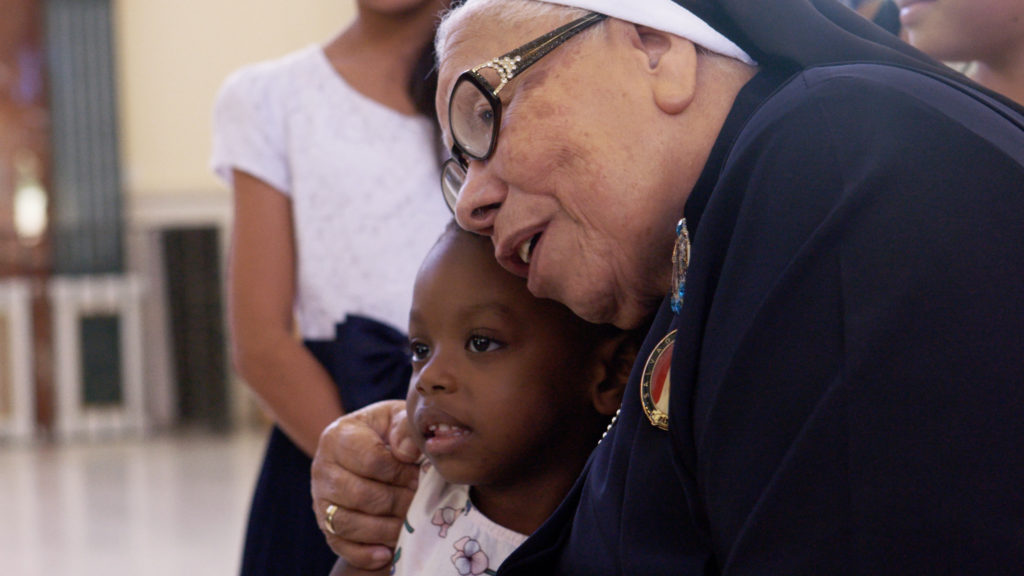In 1932, Maria Rosa Leggol was an orphan in one of the poorest countries in the world. By the time of her death in 2020, this woman had created thousands of projects focused on helping children and their families, including more than 500 homes for orphans, teens, and single mothers, 150 medical clinics, factories, bakeries, agricultural cooperatives, and schools.
How was this possible?
“With This Light” is a meticulous, elegant, and beautifully shot new documentary on the life and legacy of the woman sometimes called “the Mother Teresa of Honduras.” It has been screened at the Vatican for Pope Francis, and in several locations in Los Angeles.
The film features both archival and new footage of Sister Maria Rosa Leggol (“Sor Maria,” as everyone called her). Rather than showcasing her projects (there are too many of them), the doc wants us to meet Sor Maria herself and the people impacted by her work.
The film intertwines Leggol’s story with those of two young women. Rosa, 18, spent all her life in one of orphanages founded by the Honduran nun and is preparing to go to college. We see her recall her childhood of violence and abuse and confront her fears of the future. Meanwhile, Maria, 14, risks her life every day to get a high school education in one of Sor Maria’s schools, in the hope of breaking free from the cycle of poverty and violence that has entrapped her family.

We hear Sor Maria recount the exact day when, at the age of 6, she saw three Franciscan nuns in the town of Puerto Cortes. She was shocked to learn that they had come to tend people like her, orphans. Soon after, she recounts, she entered their house and told the nuns “Sisters, I want to stay with you because I want to become one of you.”
What emerges is the portrait of a woman who, having lost her parents early in life, felt that her mission was to be a mother to the many lost and abandoned children of Honduras. The heart of her vocation was not the calling to be a woman religious, but the fundamental calling to every Christian: to love, to give one’s life for the other.
Sor Maria understood this at an early age, and stayed faithful to this mission throughout her life. “The only brief I received from God is to love and to serve,” she says in the film.
In a remarkable testimony of faith, she even comes to regard the tragedy of losing her parents as a blessing: “When I was little, the Lord took from me everything that could hinder a girl from doing God’s will.”
Through the words of Sor Maria, the documentary shows us how to live this vocation in our everyday life. For example, Sor Maria never put money first. At every step in her life, she begged God to show her the way, to give her signs. “God’s projects are not determined by money; and when we think we can’t do it, let us ask the Lord, give me a light.”
Somebody who wants to do God’s will cannot accept to settle down and try to live comfortably. “My path is to open paths so others can walk,” she says. “I cannot stay put, I have to move forward.”
The Franciscan nun is best known for founding Sociedad Amigos de los Niños in 1966. Shortly afterward, Sor Maria rescued children living inside a Honduran prison with their parents and placed them in the foundation’s first homes.
Sor Maria recalls the advice she received by Father Guillermo, one of her earliest collaborators. “Sister, do not worry to let them go around a bit. When they come back bruised up, you help them. They come back because they know that this is their place, that here they are loved.”
One of the most moving scenes comes at the end of the documentary, when Rosa and her mother meet with Leggol, shortly before her death. “Until the day that God takes me, I will be here loving you,” she says to Rosa. And she invites her not to be too harsh on her mother, who, despite everything, always came to visit her.

Rosa’s mother had “loaned” her daughter to her former husband and mother-in-law, who subjected her to unspeakable violence and abuse. Sor Maria’s words to the young woman invite her not to hold grudges based on the past, but to forgive.
The documentary focuses heavily on the work done by Sor Maria’s collaborators to help Honduran children get an education, become independent, and escape the poverty and violence in which they are enmeshed. This is important and fundamental to understanding who she was and what she did. But the film could have benefited from more attention to another key, fascinating aspect of her legacy: how Sor Maria’s collaborators, most of them lay people and women religious, care for the spiritual needs of the children.
Receiving an education and becoming financially independent are very important. But more important is seeing how children can be led to discover that their vocation is to love, just like Sor Maria did and taught, and that living this vocation is crucial to their happiness.
“My job is to continue giving out mercy … for this, my children, you have a mission. Reflect what Sociedad Amigos de los Niños is: a work of redemption and love,” she says in the film. “There cannot be a person that you do not love.”
The power to follow this mission comes from the Lord. In “With this Light,” Sor Maria is always seen with a crucifix in her hands: “Without Jesus I do not take one step forward,” she says.
“With this Light” is available on demand on various platforms. Visit WiththisLight.com for more information.

